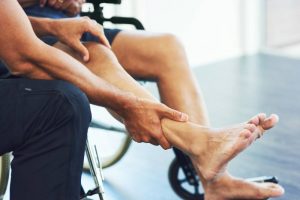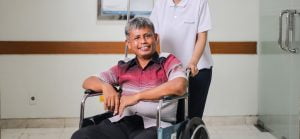All people change because of aging process, both physically and mentally. However, unlike the widely spread myths, aging is not the same as dementia. Older people are more prone to dementia, but not all of them have dementia. However, we still need to be aware of the risks of dementia in the elderly because the side effects can be prolonged and pose a health risk.
What is Dementia
Dementia is a condition in which a person’s thinking abilities decrease to the point that it affects his/her daily life and activities. These abilities are related to thinking, memory, language, and reasoning. People with dementia often experience personality and behavior changes and have difficulty controlling emotions. Severe dementia may cause a person to be completely dependent on others to perform basic tasks in daily life.
Dementia and the elderly are not two things that certainly go hand in hand. Dementia is not a natural part of aging. Approximately one-third of adults aged 85 and older show symptoms of dementia, but many can reach age 90 with little to no signs of dementia.
Dementia occurs when there is a problem with a person’s neurological function that inevitably decreases with age. However, people aged 40-50 can also have dementia. The term for the condition is younger or early onset dementia, which is a type of dementia diagnosed in people under 65 years of age.
There is no specific treatment to cure people with dementia and no proven method of prevention. But in general, a healthy lifestyle can help reduce the risk factors associated with this disease.
Different Types of Dementia
There are many different types of dementia found around the world. These include vascular dementia, Alzheimer’s, frontotemporal dementia, and Lewy Body dementia.
- Alzheimer’s: as many as 60-80 percent of people who show symptoms of dementia have this disease. The trigger is changes in the brain, including the build-up of amyloid protein and tau protein.
- Frontotemporal dementia: this type of dementia tends to affect people under 60 years of age. The cause is a progressive loss of nerve cells in the frontal lobe of the brain (behind the forehead) and temporal lobe (behind the ear).
- Vascular dementia: this type of dementia occurs due to damage to blood vessels or obstruction of blood flow and oxygen to the brain.
- Lewy Body dementia: this type of dementia is triggered by the build-up of a protein called Lewy Body in the brain.
In addition to the four types of dementia, the researchers identified several other conditions that cause dementia or have symptoms similar to dementia, such as:
- Creutzfeldt-Jakob disease: a rare brain disease
- Huntington’s disease: hereditary progressive brain disease
- Acute traumatic encephalopathy: problems with cognitive function due to repeated traumatic brain injury
- HIV-associated dementia: a rare disease that occurs when the HIV virus spreads to the brain
- Mixed dementia: combination of two or more types of dementia
How to Recognize the Symptoms
The signs and symptoms of dementia appear when healthy nerve cells or neurons in the brain become dysfunctional, lose connection with other brain cells, and die. Aging causes the loss of some neurons, but the number of cells lost in people with dementia is higher. People with dementia are often unaware of their condition. In this case, the role of the family is needed to identify the symptoms in order to get medical help as soon as possible.
The symptoms and signs of dementia are not always the same for everyone. For example:
- Partial or complete memory loss
- Confusion
- Inability to make good decisions
- Difficulty speaking, understanding, and expressing opinions, as well as reading and writing
- Wandering alone and getting lost in a familiar environment
- Questioning the same things repeatedly
- Using unusual terms when mentioning certain things
- It takes longer to do daily activities
- No longer interested in certain activities or events
- Experiencing hallucinations, delusions, or paranoia
- Insensitive to other people’s feelings
- Imbalance
To diagnose dementia, the doctor will check if there are health conditions associated with the patients’ mental function. A physical exam, which includes measuring blood pressure and checking for other vital signs, such as blood tests and hormone, vitamin, and body chemicals tests, can also be done to determine the cause of the symptoms.
When to Seek Help
People with dementia should seek medical attention immediately. If there are family members who increasingly forget something, invite them to consult a doctor to identify early signs of dementia. Memory loss is often the first symptom recognized when people have dementia.
However, it is often difficult for people to know the symptoms of dementia on their own. Even if they suspect they have symptoms of dementia, they may be reluctant to open up for a variety of reasons, such as anxiety or fear. If dementia is caught early, the process can be slowed down and the affected individuals can maintain cognitive abilities longer through appropriate treatment.
Role of Medical Personnel
People diagnosed with dementia will be treated by several medical personnel who come together as a care team. Patients may be confused to see the number of medical personnel involved, but their presence is required according to their respective expertise.
These medical personnel include geriatric doctors who specialize in treating elderly patients, neurologists who specialize in diseases of the nervous system, psychiatrists who assist in the assessment and treatment of mental illnesses, psychologists who provide psychosocial care, language and speech therapists who help improve communication and/or swallowing skills, occupational therapists who assist with cognitive function recovery therapy, and physical therapists who prepare physical exercise programs for patients.
Role of Family
Caring for dementia patients also requires a family role. Dementia affects not only one individual, but all family members. Conflicts may arise within the family about care responsibilities for the patient. For example, a grandfather has dementia, while his wife is too old and fragile to help with treatment. While their children are married and live in their own home.
In that case, there should be arrangements regarding care responsibilities for the grandfather. Otherwise, he is prone to abuse or mistreatment by his own family. All members of the family should work together as a team to provide full support. If necessary, employ professional caregivers and therapists who can provide home care service while helping dementia patients to improve their quality of life.



